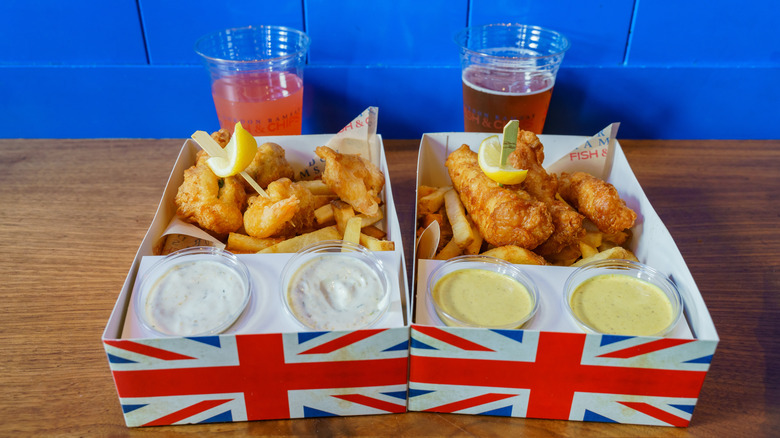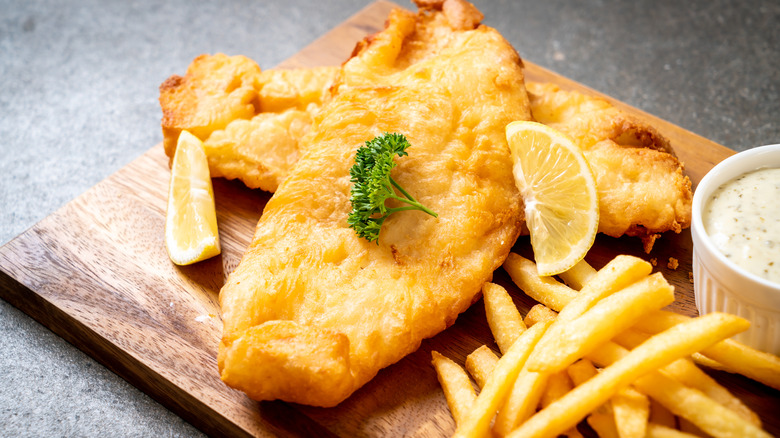TikTok Is Coming After Gordon Ramsay For Alleged Unsanitary Las Vegas Restaurant
When you think of unsanitary restaurant practices that cause health department red flags, you may think of things like raw and cooked meats touching one another, poor hand-washing practices, bug or rodent infestations, or employees using food items that are beyond their best-by dates. However, the idea that one of Gordon Ramsay's joints might fall into this category is even more shocking, especially when you're witness to how particular he is on shows such as "Hell's Kitchen" and "MasterChef".
In a recent TikTok, Keith Lee, a food reviewer with over 3 million followers, posted a video about Gordon Ramsay's Las Vegas restaurant, Fish & Chips. In the clip, which was filmed after Lee had visited the eatery, he reported that he found the kitchen to be unclean. He described seeing what appeared to be frozen, cooked fish in close proximity to raw fish and customers' orders that were waiting to be completed. "It made me uncomfortable. I have a shellfish allergy so my red flags went off immediately. I don't want to get sick," he said. He also stated that when he told the staff about his allergy, they responded, "Everything in here is contaminated," and even if he ordered chicken, it would be fried in the same oil as the fish and shellfish. Commenters on Lee's TikTok expressed their surprise and outrage that Ramsay could let these apparent health issues slide at one of his restaurants.
TikTok calls on Ramsay to respond
One of Lee's viewers said, "Gordon need to do a kitchen nightmare on his own restaurant," referring to "Kitchen Nightmares," the show that Ramsay himself cancelled after dealing with one too many dodgy hospitality owners. Another told Lee, "That's unacceptable. I'm sorry you had this experience but I hope they learn from this!"
People were curious to know if Ramsay would respond to the video, and many tagged the chef in their comments to say things like, "I couldn't imagine @gordonramsayofficial allowing this. Hopefully he sees your video," and "@Gordon Ramsay is this for real? Time to pop in on your restaurant mate." People who had seen Lee's video even took to an unrelated TikTok that Ramsay posted about a "Thanksgiving Wellington," telling him to "check on your Vegas restaurant." The celebrity chef has yet to respond.
Some commenters on Lee's post seemed shocked that a restaurant wouldn't be more careful about mixing proteins. "They just didn't wanna work bro, there's no way a restaurant even operates like that when serving different meats," one said. Another wrote, "I work at McDonald's and even we fry our fish in different oil than our chicken." Other users, referring to the staff member who told Lee that everything was contaminated, said they appreciated her honesty and called her a "real one." With the exception of chicken and sausage items, everything else on the Fish & Chips menu contains seafood, so it stands to reason that the chances of a shellfish cross-contamination would be high.
Would you dine at a seafood restaurant with a shellfish allergy?
A small kitchen such as the Las Vegas Fish & Chips one may plausibly look messy in the height of service, but of course this doesn't excuse apparent health concerns. What the TikTok user described could have been a state of disorganization at best, or cross-contamination between raw and cooked items at worst, which would be a definite red flag in terms of health practices.
However, those with shellfish allergies are often advised to avoid seafood restaurants, as cross-contamination between various seafood items is much more likely to occur, according to Allergic Living. The website also points out that it's important to check that restaurants can accommodate allergies before you visit them. The Fish & Chips kitchen is set up much like the way a standard fish and chips shop in the U.K. is, in that the kitchen is behind a counter so customers can see the cooking process. In this situation, unless a kitchen is specifically equipped to accommodate them, staff may be instructed to inform guests with allergies that cross-contamination is a possibility, as they don't want the responsibility of a bad reaction or death on their hands.


